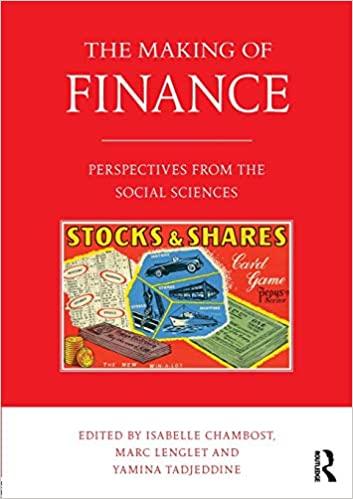Question
The management of EastSide, Inc. is preparing its capital budget for 2023. EastSide has two divisions. One runs a restaurant (the Restaurant Division). The other
The management of EastSide, Inc. is preparing its capital budget for 2023. EastSide has two divisions. One runs a restaurant (the Restaurant Division). The other brews and distributes beer (the Brewery Division). Most of the analysis and decisions for projects that require capital budgeting outlays for 2023 has been completed, but the analysis for the Ingredients Processing Adjustment (IPA) project needs wrapping up and a decision must be reached on what to do with IPE.
The IPA project is one that is expected to have no impact on sales revenue, but reduce costs in the Brewery Division. The capital investment for equipment required for the IPA project in question is $600,000, which is due as lump sum at the beginning of the project, in early 2023. Setup costs associated with the equipment are expected to add another 15 percent (or $45,000) to the initial investment. Management believes that the investment and expenses associated with buying and setting up the equipment will be depreciated using straight-line method of depreciation. According to straight-line depreciation method, the purchase price of equipment (and setup) is depreciated by equal amounts each year to its expected salvage (sale) price at the end of its expected life. The equipment is expected to have a five-year operating life. At the end of that period, in the end of 2027, the machinery is expected to be sold for $185,000.
The expected benefits of the new equipment are twofold. First, management expects to reduce direct labor costs (due to more efficient labor utilization) by a total of 10% of total sales revenue in each year for five years, as long as the equipment is operational. Second, management believes that the new machine will reduce hops used in the manufacturing process by 5000 pounds per year. Each pound of hops is expected to cost $10 for the foreseeable future.
The new machinery is very sensitive to the ingredients (hops and barley), which will affect the cost of annual maintenance. Management is not exactly sure how to estimate the maintenance expenses, but is sure that whatever they are, they will be treated as a tax-deductible expense in the period in which they are incurred.
After careful discussion with the equipment vendor, management has concluded that there is a 20 percent probability that the machine will require $50,000 per year before tax during its fiveyear life in maintenance. There is a 50 percent chance that it will require $30,000 annual maintenance expense. Further, management believes that there is a 30 percent chance that annual maintenance expense will be only $10,000. The cost of maintenance is not expected to change during the life of the equipment
Importantly, management expects the total projected sales revenue in the Brewery division in 2023 to be $1,000,000, to be $2,500,000 in the Restaurant division. Regardless of the projects acceptance (that is, with or without the project), total revenues are expected to grow by 10 percent per year at least for the next ten years due to inflation and market growth. Costs of goods sold and operating costs make up in total 60% of sales in the Restaurant division and 50% of sales in the Brewery division for the foreseeable future (at least 10 years or so).
The CFO has indicated that regardless of the source of financing used, the nominal after tax cost of capital for all projects considered by the brewery is 10% for the foreseeable future. Also, a tax rate of 21 percent should be used in all analyses.
Questions:
A. Should the company invest in the IPA equipment?
B. Suppose now that in addition to labor savings and quality improvements, management believes that the new equipment will enhance working capital productivity. Specifically, management projects that the firms required investment in work-in-progress inventory will decline from 30 percent of sales to 10 percent of sales. How, if at all, does this change your answer to question A?
Step by Step Solution
There are 3 Steps involved in it
Step: 1

Get Instant Access to Expert-Tailored Solutions
See step-by-step solutions with expert insights and AI powered tools for academic success
Step: 2

Step: 3

Ace Your Homework with AI
Get the answers you need in no time with our AI-driven, step-by-step assistance
Get Started


